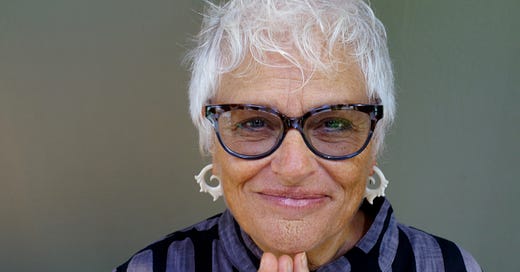Watch My Intimate Conversation With Jazz/Improvisational Vocalist Rhiannon
What happens when feminism, spirituality and jazz come together? Alive!
Last year, just a few months into the pandemic, I began hosting a bi-weekly series, initially on Instagram, called Have You Ever Heard...? The initial purpose was to have conversations with both music makers and music lovers about particular albums that seemed to be cult favorites, so to speak, and not necessarily mainstream favorites.
One of the first people I reached out to was Rhiannon, one of the founding members of Alive!, an all-woman jazz ensemble that emerged out of the women’s music community. Alive! burst onto the scene in 1976 with a fusion of elements and sounds that made them hard to categorize. The group was comprised of Barbara Borden on drums, Carolyn Brandy on congas and percussion, Janet Small on piano, Susanne DiVincenzo on bass and cello and Rhiannon (with a lower case r in those days) on lead vocals.
Jeannette Muzima, a writer for the feminist journal Sojourner, described them this way in 1978:
“Their music sounds and sings like what it is, a combination, a special blend of African and Latin rhythms, classical melody and harmony, and jazz modes. The women combine these great musical traditions and use them as a basis on which to build a further step out into experimental areas, carrying on from where their own lives have taken them and exploring new realms where we all might like to be. Hearing their music, we all become lovers—of the music—of each other—of the earth.”
Their debut album, the subject of my conversation with Rhiannon, drew praise from both lovers of women’s culture and the mainstream press when it was released in November 1979. The Boston Globe hailed the album as “one of the finer new women’s albums released both musically and technically,” stating that their “feminist politics are strong, yet so interwoven into the fabric of the music that the record’s appeal is not limited to women.”
Indeed, Alive!, produced by composer and pianist Althea Waites, addresses colonialism, capitalism, environmental concerns and encourages a self-confrontational wholeness, which was a consistent theme in women’s music circles. Closing with a ten-minute homage to Yoruba deity Yemaya, the album circles the trajectory of awakening, the inherent spirituality of self-awareness and self-knowledge.
As a group, they were not seeking to “make it big,” but rather to do the work of raising consciousness through sound. Keyboardist Janet Small told the Philadelphia Daily News, “All we care about is what people feel when they leave—that they’ve gotten turned on by the music.” As white women in jazz, they saw themselves “sharing, participating in that tradition” created by black artists, Rhiannon told the same reporter, pointing their audience back to the creators of the music.
“A lot of people are getting sick of the music of the dominant culture,” Rhiannon told The Burlington Free Press the weekend of the album’s release. “They want to hear something deep and spiritual. Spiritual meaning connected to the earth, to the environment.”
Ultimately, the group would continue as a unit for a decade, disbanding in 1986, but they have continued to reunite in the years since, most recently in 2017. Alive! Is finally available again, now digitally, after being out of print for decades (Their final album City Life and a 14-track retrospective, Always Alive! are also available digitally). Visit alivejazz.com for links to the group member’s individual websites and for additional information.
After hearing only the original vinyl and vinyl transfers, the remaster is a revelation in many ways. Details in Carolyn Brandy’s percussive elements and Barbara Borden’s drums are enhanced. Suzanne Vincenza’s cello is almost third dimensional and Rhiannon’s every breath whirls and whooshes the listener through every terrain the group is creating—invoking—together. Listen on iTunes and Amazon.
My conversation with Rhiannon is below.
[One note: I mis-spoke in our conversation and said that Michelle Rosewoman also wrote Meg Christian’s “Face The Music.” “Face the Music” was written by Annie Dinerman. Rosewoman did, however, write Teresa Trull’s “Let It Be Known” which is what I was thinking of!]
Other features on Women’s Music:
“From Separatism to Spiritual Reckoning: Meg Christian’s path to Recovery and Rebirth”
“Testimony: Consciousness Raising in Women’s Music”
To subscribe to my weekly newsletter, click here.




